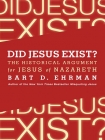Did Jesus Exist? - The Historical Argument for Jesus of Nazareth Bart Ehrman (books to read in your 20s txt) 📖

- Author: Bart Ehrman
Book online «Did Jesus Exist? - The Historical Argument for Jesus of Nazareth Bart Ehrman (books to read in your 20s txt) 📖». Author Bart Ehrman
Each of these views has had serious scholarly proponents.1 But none of them represents the views of the majority of scholars in modern times. Instead, as I have repeatedly noted, most scholars in both the United States and Europe over the past century have been convinced that Jesus is best understood as a Jewish apocalyptic preacher who anticipated that God was soon to intervene in history to overthrow the powers of evil now controlling this world in order to bring in a new order, a new kingdom here on earth, the kingdom of God. This was essentially the view that Albert Schweitzer popularized in his famous book, The Quest of the Historical Jesus. Schweitzer was not the first to articulate this view, but he was the first to bring it to wide public attention.2 And even though there are no scholars who agree any longer with the details of how Schweitzer worked out his views, there is still broad agreement that the fundamental assumption behind them is correct, that Jesus really did anticipate a cataclysmic break in the course of history when God would judge the world and set it to rights, establishing a rule of peace and justice here on earth, sometime, Jesus thought, within his own generation.
In my discussion here I will not go into great depth either to show why this view of Jesus is so widely seen to be correct or to explicate all the details of Jesus’s life that fit so well this way of understanding him. I have already discussed the matter at greater length in my earlier book Jesus: Apocalyptic Prophet of the New Millennium. Here I will simply provide a brief overview to accomplish three major tasks: (a) I will show what we can know about ancient Jewish apocalyptic thinking in the days of Jesus since Jesus was not the only apocalypticist of his time (far from it), and we need to know about Jesus’s historical context if we expect to learn anything about his life; (b) I will discuss the various criteria that scholars use to determine which of the many traditions about Jesus are probably historically reliable (I have begun doing this already in the earlier chapters); and (c) I will provide an overview of what the rigorous application of these criteria yield, explaining the most important features of Jesus’s life that we can know about with relative certainty. The first two tasks will take up the rest of the present chapter; the third will be the topic of the next.
Unity and Diversity in First-Century Judaism
TO MAKE SENSE OF the apocalyptic perspective that appears to have been so prominent among Jews in the days of Jesus, we first need to situate ourselves more broadly in the first-century Jewish world. As we will see, there were wide-ranging differences among Jews around the time of Jesus. Even so, some very basic things can be said about Judaism as a whole.3
To begin with, almost all Jews were monotheists. This does not seem like an extraordinary thing in our day, but in the ancient world it is one of the main features of the Jewish religion that made it so unlike the other religions in the Roman Empire. All other religions were polytheistic; pagans recognized many gods living in all sorts of places and serving all sorts of functions.4 There were the great gods of the empire (mainly the ones we know about from Greek and Roman myth); there were gods of the different cities, towns, and villages; gods of a field, a forest, a stream, a house, and a hearth. There were gods who controlled the weather, gods who controlled the crops, gods who controlled childbirth and health; there were gods of war, gods of love, gods of personal welfare. All these gods, and many others, deserved worship, and since there were so many of them none of these gods, at least in the period we are talking about, was thought to be jealous of another, in the sense that they alone were to be worshipped. People worshipped all the gods that they wanted and chose to. But not in Judaism. Jews had only one God, and this made Jews different from all other peoples.
The God of the Jews was believed by the Jews (and them alone) to have created the world and ultimately to be sovereign over it. Jews did not insist that other people worship this God, but he was the only God for them. Among the first of the commandments given to the Jews by this God was “You shall have no other gods before me.” Jews by and large did not deny that other gods existed, but they were not to be worshipped by the Jews themselves.
In no small measure this was because Jews believed that their God not only created all things but also chose them, the Jewish people, to be uniquely related to him. He was their God, and they alone were his people. God had shown that he chose them way back in the days of Moses when he miraculously brought the children of Israel out of their slavery in Egypt, destroyed their enemies, and then gave them his Law, the Law of Moses delivered on Mount Sinai (see Exodus 1–20 in the Hebrew Bible). Jews believed that in those days God had made a kind of covenant (or peace treaty) with them. The covenantal agreement, at its heart, was very simple. God had chosen Israel. He would be their God, and they would be his





Comments (0)